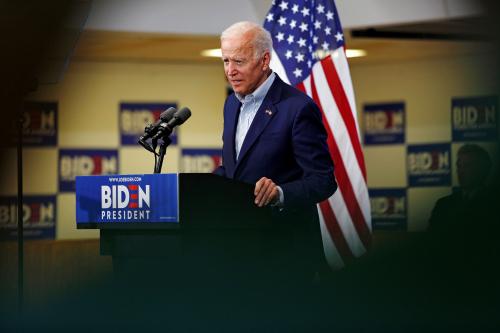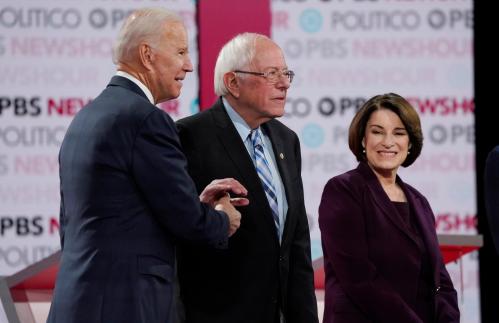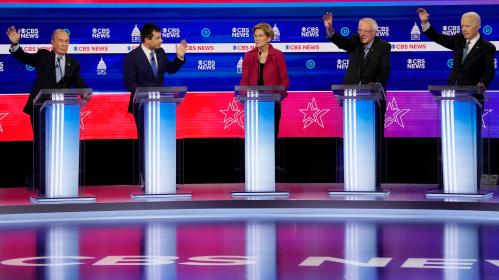In the wake of the first Democratic debates, polling anarchy has erupted. There have been six post-debate surveys. Three place support for Joe Biden, the putative leader of the pack, in the low 20s with other candidates nipping at his heels. Three others put him at 30 percent or above, with a comfortable lead over his challengers. Differences in timing and methodology may explain part of this disagreement, but not all.
One common way to make sense out of disparate polls is simply to average the results, on the theory that the average is likely to be closer to reality than any single poll. For what it’s worth, this technique produces the following post-debate standings:
|
|
Polling Average |
| Biden | 27 |
| Sanders | 15 |
| Harris | 15 |
| Warren | 15 |
| Buttigieg | 5 |
A safer strategy is to look at the direction of change in order to get a sense of the pre-debate/post-debate dynamics. There’s no doubt that Biden has taken a hit, Kamala Harris has surged, Bernie Sanders has fallen back a bit, Elizabeth Warren is somewhat stronger, and the bloom is off Pete Buttigieg’s rose. There is broad agreement that Warren won the first debate, Harris the second, and that Harris performed best overall.
Because the primaries are a sequence of individual contests, with earlier results influencing later ones, it makes sense to scrutinize Iowa polls as well as national surveys. A comparison of the post-debate Suffolk/USA Today Iowa survey results with the average of two Iowa polls taken in early June yields the following results:
| Suffolk/USA Today | Early June Average | Change | |
| Biden | 24 | 27 | -3 |
| Sanders | 9 | 19 | -10 |
| Warren | 13 | 14 | -1 |
| Harris | 16 | 6 | +10 |
| Buttigieg | 6 | 13 | -7 |
These data suggest that Biden suffered a flesh wound rather than a mortal injury during the first debate and that Harris’s surge came mostly at the expense of candidates other than Biden. Other inferences: with competition from Warren and others for the allegiance of the Democratic left, Sanders’ lead in this sector of the party has evaporated. And after making a terrific first impression, Buttigieg has lost ground, more because of trouble at home than a poor debate performance.
Analysts have long wondered about the relative impact of watching the debates as opposed to following the post-debate commentary and video clips. This time, FiveThirtyEight teamed up with Morning Consult to compare these two groups. Here’s what they found:
|
Debate Watchers |
Non-Watchers |
|||||
| Before | After | Change | Before | After | Change | |
| Biden | 36 | 28 | -8 | 35 | 29 | -6 |
| Harris | 8 | 21 | +13 | 6 | 10 | +4 |
| Sanders | 18 | 17 | -1 | 20 | 21 | +1 |
| Warren | 15 | 15 | — | 11 | 13 | +2 |
| Buttigieg | 8 | 6 | -2 | 4 | 4 | — |
| Castro | 1 | 2 | +1 | 0 | 0 | — |
| Booker | 3 | 2 | -1 | 3 | 2 | -1 |
| O’Rourke | 4 | 2 | -2 | 6 | 4 | -1 |
No other candidates moved the needle, one way or the other.
These data are self-explanatory. Differences between watchers and non-watchers were modest, with one exception: Harris’s gains among watchers exceeded those among non-watchers by a stunning 9 percentage points. When something really dramatic happens, it appears, you have to experience it directly to feel the full effect.
There’s another way of looking at the effect of the first debates that illuminates what may happen afterwards. In two surveys—one pre-debate, the other post-debate—CNN asked, “Aside from the candidate you support, which candidates do you most want to hear more about?”
|
|
Post-debate |
Pre-debate |
Change |
|
Harris |
30 |
23 |
+7 |
|
Warren |
24 |
20 |
+4 |
|
Buttigieg |
23 |
17 |
+6 |
|
Booker |
17 |
15 |
+2 |
|
Castro |
16 |
3 |
+13 |
As these comparisons illustrate, lots of people were curious about Harris before the debate; even more feel that way now. Julian Castro caught people’s attention with his strong performance on immigration. The door is still open for Buttigieg to recover some of his lost support—if he develops a strong second act. In contrast, Democrats seem to be closing the book on O’Rourke, whose campaign is struggling without visible success to regain dwindling voter attention.
In politics as in markets, expectations matter. This gives us yet a third way of evaluating the impact for the first debates. The post-debate Iowa survey asked voters, “Who did better than you expected?” and “Who did worse than you expected?”
|
|
Better |
Worse |
Net |
|
Harris |
50 |
5 |
+45 |
|
Castro |
29 |
3 |
+26 |
|
Buttigieg |
22 |
5 |
+17 |
|
Warren |
18 |
4 |
+14 |
|
Booker |
13 |
5 |
+8 |
|
O’Rourke |
3 |
16 |
-13 |
|
Sanders |
4 |
23 |
-19 |
|
Biden |
8 |
41 |
-33 |
These results closely track the curiosity findings. As before, the front-runners disappointed the voters, Biden the most; Harris astounded them, Castro surprised them, Warren helped herself modestly, Buttigieg is still in the game, and O’Rourke is fading.
And finally, what about “electability,” the buzz-word of this election cycle? Here the data are ambiguous, if not outright contradictory. On the one hand, Democrats consistently say that they are more interested in finding a candidate who can beat President Trump than they are a candidate with whom they agree on the issues. In the most recent Gallup survey, electability beats issue agreement, 58 percent to 39 percent; CNN puts it at 61-30, and Economist/YouGov at 66-34.
Other the other hand, support for Joe Biden, the candidate widely regarded as most electable, lags far behind his electability ratings. For example:
|
|
Best chance of beating Trump |
First choice for the nomination |
Gap |
|
Quinnipiac |
42 |
22 |
20 |
|
CNN |
43 |
22 |
21 |
|
ABC/WP |
45 |
30 |
15 |
If electability is helping Biden retain the lead, other factors are reducing his margin over the other candidates. Voters’ belief that Biden has the best chance of beating Trump is a necessary condition for his victory in the nominating contest, but it may not prove sufficient.
Rather than pitting the Democrats against one another, the Economist/YouGov survey asks respondents to evaluate each candidate’s chance against President Trump:
|
|
Will probably defeat Trump |
Will probably lose to Trump |
|
Biden |
62 |
16 |
|
Harris |
50 |
20 |
|
Buttigieg |
32 |
27 |
|
Warren |
29 |
44 |
While it’s no surprise that Biden comes out ahead, it is surprising that Harris has also cleared the electability threshold. Buttigieg is in positive territory, but with 4 in 10 Democrats as yet unable to render a verdict. By contrast, Democrats doubt that the two contenders for the leadership of their party’s left can evict Donald Trump from the White house.
Moreover, Biden wins the electability contest among registered voters as a whole. Results from an ABC/Washington Post survey released July 7 show the former vice president outpacing the rest of the field in head-to-head contests with President Trump.
|
|
Democratic candidate |
Trump |
|
Biden |
53 |
43 |
|
Warren |
48 |
48 |
|
Buttigieg |
47 |
47 |
|
Sanders |
48 |
49 |
|
Harris |
46 |
48 |
Seasoned observers will take these results with a healthy pinch of salt. Early in 1983, a survey showed Walter Mondale leading Ronald Reagan by 12 percentage points, and the former vice president still led, by a smaller margin, as late as September of the pre-election year. History records what happened next.
Still, the latest evidence does nothing to undermine Democrats’ belief that despite Harris’s strong performance in the first debate, Joe Biden remains the most electable candidate in the field. The burden of proof is on the other candidates to change the minds of their party’s rank and file. For the moment, anyway, he remains the man to beat—which is not to say that he cannot be beaten.







Commentary
What we know after the first Democratic debate
July 8, 2019